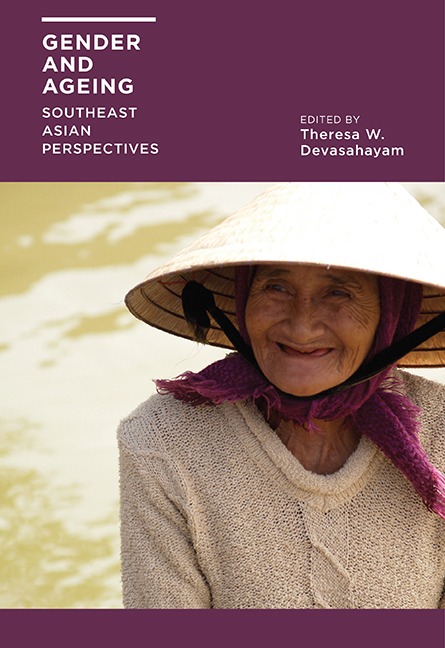Book contents
- Frontmatter
- Contents
- List of Tables and Figures
- Acknowledgments
- Contributors
- 1 Growing Old in Southeast Asia: What Do We Know about Gender?
- 2 Gender and Ageing in Thailand: A Situation Analysis of Older Women and Men
- 3 Gender and Well-being of Older Persons in Cambodia
- 4 Preparations for Old Age and Social Participation of Present and Future Older Persons in Thailand: Gender Difference
- 5 Gender and Health Status among Older Adults in Vietnam
- 6 Ageing and Gender Preferences in Rural Indonesia
- 7 Exploring the Experiences of Older Men and Women in Caregiving and Care-receiving in Sarawak, Malaysia
- 8 An “Active Ageing” Approach to Living Alone: Older Men and Women Living in Rental Flats in Singapore
- 9 Ethnic Patterns and Styles of Active Ageing among Widows and Widowers in Singapore
- 10 Employment Patterns of Older Women in Indonesia
- 11 Gender Differentials in Work and Income among Older Malaysians
- 12 Gender and Economic Well-being among Older Filipinos
- 13 Work, Retirement and the Gender Divide in the Philippines
- Index
6 - Ageing and Gender Preferences in Rural Indonesia
Published online by Cambridge University Press: 21 October 2015
- Frontmatter
- Contents
- List of Tables and Figures
- Acknowledgments
- Contributors
- 1 Growing Old in Southeast Asia: What Do We Know about Gender?
- 2 Gender and Ageing in Thailand: A Situation Analysis of Older Women and Men
- 3 Gender and Well-being of Older Persons in Cambodia
- 4 Preparations for Old Age and Social Participation of Present and Future Older Persons in Thailand: Gender Difference
- 5 Gender and Health Status among Older Adults in Vietnam
- 6 Ageing and Gender Preferences in Rural Indonesia
- 7 Exploring the Experiences of Older Men and Women in Caregiving and Care-receiving in Sarawak, Malaysia
- 8 An “Active Ageing” Approach to Living Alone: Older Men and Women Living in Rental Flats in Singapore
- 9 Ethnic Patterns and Styles of Active Ageing among Widows and Widowers in Singapore
- 10 Employment Patterns of Older Women in Indonesia
- 11 Gender Differentials in Work and Income among Older Malaysians
- 12 Gender and Economic Well-being among Older Filipinos
- 13 Work, Retirement and the Gender Divide in the Philippines
- Index
Summary
Over the last two decades, gender has moved steadily up the agenda of interdisciplinary population studies, beginning with a number of early programmatic statements (Mason 1993; Greenhalgh 1994; Obermeyer 1995), and continuing via substantial collections (e.g. Bledsoe, Lerner and Guyer 2000) and in-depth studies (Basu 1992; Bledsoe 2002; Johnson-Hanks 2006). The increasing focus among demographers over the same period on consequences of demographic transition has made the conjunction of two themes — ageing and gender — inescapable. Demographic data at the national level readily show potentially significant economic and social differentials between men and women, and these data have been used to make a general case for important gender disadvantages in later life, particularly for women. The impact of disadvantages, by implication, accumulates across the life course. Thus, in Indonesia, women's disadvantage is found in variables like the years of education they receive, their income stream, whether they participate equally in formal sector employment, enjoy equity in marriage choices, and have equal access to pensions (Malhotra 1991; Rudkin 1993; Adioetomo and Eggleston 1998; Kevane and Levine 2003; Samosir, Tuhiman and Asmanedi 2004). The accumulative effects of these differences, however, are less clear. Women participate extensively in intergenerational transfers, leading some commentators to conclude that gender differences in support provision for older people are “practically non-existent” (Frankenberg and Kuhn 2004, p. 27). General patterns of economic and social change in which elders receive support from both sons and daughters, and which often give particular emphasis to daughters' roles in providing personal care, continue to follow tradition. In other words, most elders appear to find that both daughters and sons deliver — even though some gendered aspects of the life course, and elders' expectations about gendered kinds of support, remain unequal.
Generalized statements of gender disadvantage or advantage, no matter how systematic the survey data on which they rely, can only take us part of the way to understanding whether and how gender differences actually impact on later life.
- Type
- Chapter
- Information
- Gender and AgeingSoutheast Asian Perspectives, pp. 150 - 173Publisher: ISEAS–Yusof Ishak InstitutePrint publication year: 2014



